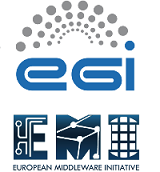Speaker
Description of the work
Grid computing infrastructure effectively supports computing and similar e-services for scientific research and R&D, id est for e-Science. To develop and use grid computing in academic sector a special program „The Lithuanian distributed and parallel computing and e-services network” has been developed, offering to scientists and specialists a technology, which grants suitable computing and e-services resources. Lithuanian Grid functionality includes: a) deployment, maintenance and upgrading of grid infrastructure and e-services (currently Grid operates over 500 processors, has over 30 TB storage capacity, about 90 users, serves numerous scientific research areas), b) analysis, design, test deployment of „cloud computing“ technology, especially in relation to grids, c) serve for new users, their training tasks, d) creation, maintenance and deployment of grid certificating procedure, e) presentation of Grid activities and capabilities to the society, to potential users, to public sector and business, developing new grid projects. Grid consist of 13 academic institutions as partners: most active Lithuanian universities, research institutes and colleges. Lithuanian NREN Litnet provides the network infrastructure with 1Gbps throughput connection between sites. The special communication center to support distributed computing data exchange has been implemented. Grid infrastructure is now based on gLite middleware, however several other operational systems are under consideration to be deployed (KnowARC, Globus, UNICORE, CREAM). Three sites are running central services (WMS, VOMS, LFC) for Lithuanian Grid. The important task for Grid is to participate in EGI and in FP7 project EGI-InSPIRE. Such activities grant access to new technologies, developments, innovations, enables to take part in support and
development procedures. The essential links for Grid are relations to Scandinavian countries grids, as well as joint efforts with Belarus academic institutions.
Overview
Grid technology, connecting geographically distributed clusters into heterogeneous computing system via communication network, gives efficient infrastructure for computing procedures and comprehensive data maintenance
functionality. The „Lithuanian distributed and parallel computing and e-services network” program is presented and discussed. The status quo of Lithuanian Grid, it's technical resources, software solutions, functionality of
data and computing procedures manipulation, research areas with applications in the program are described in detail. The program, collaborating with EGI and other international partners, grants for Lithuanian Grid users access to new
computing procedures, innovations, to support and development services. It also improves qualification of computer administrators and other specialists of Lithuania. Special emphasis is giving to the role of Grid in public sector, giving services and support for medical research
Impact
Lithuanian Grid expands computing resources and research infrastructure: a) to serve joint projects with prominent scientists from abroad of Lithuanian descent, b) to suggest services for science parks (like Life Science Centre, Innovative Medicine Centre, Life Science Research Centre), business partners and research institutions (the Open Access Center of Information Technology of science parks. The challenges for Grid infrastructure are: a) to create, maintain and develop e-Infrastructure (grid, cloud computing, HPC, virtual repositories, related data sets), b) to maintain and serve academic environment, public sector, business needs, orders from foreign partners, c) to grant functionality (computing resources, modelling services, virtual repositories, data sets storage and usage, d) „on demand“ supply for computing and data, e) to unite and synchronise activities of institutions for computer-based equipment that institutions possess, f) to deploy the technological innovations or to use new technologies in grid and cloud computing, g) to encourage/help Lithuanian scientists and specialists to cooperate with well-known scientific centres and projects in the world. Grid infrastructure will cooperate and provide computing resources and extended services for public sector, namely for medical research, giving support for most essential medical and health care programs.
Conclusions
The „Lithuanian distributed and parallel computing and e-services network (Lithuanian Grid)” program’s technical resources, software solutions, functionality for data sets and repositories as well as for computing procedures provides a sound platform for many research areas, R&D, public sector (especially in medicine and in related topics). The program, collaborating with EGI and other international partners, grants for Lithuanian users the access to new technologies, developments, innovations. It also improves qualification of computer administrators and other computer science specialists of Lithuania. The development of Grid is to increase it's role in public sector, especially to provide services and support for medical research and health care programs. Grid platform will be offered for business too. An important road of development is to create/deploy related cloud computing and virtualization services, expending Grid functionality and applications.

